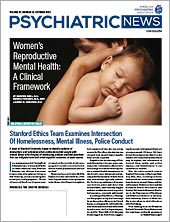Experiencing or witnessing multiple overdose events is associated with severe grief among people who inject drugs, a study in Drug and Alcohol Dependence has found.
“We know that grief can have significant deleterious effects, and we wanted to understand how it was being experienced by people in the context of the opioid overdose crisis and its unceasing onslaught of overdose deaths and near deaths,” lead author Kathleen S. Kenny, Ph.D., told Psychiatric News. She is a Canadian Institutes of Health Research postdoctoral fellow at the Manitoba Centre for Health Policy in the Department of Community Health Sciences at the University of Manitoba. “A main takeaway from the study is that cumulative, rather than single, overdose events were associated with severity of responses to grief and loss.”
Kenny and colleagues examined data from a survey of 244 people who injected drugs in four community-based harm reduction programs in Toronto. Participants were 16 years of age or older and had injected drugs in the past three months. The researchers defined three types of overdose events: the participant’s own overdose, an overdose witnessed by the participant, and the overdose death of a person important to the participant. They then asked whether participants agreed with seven statements about how they were affected by overdose-related losses. The statements included “I feel like I’ve lost parts of myself,” “I feel like life has really changed,” “I feel like things I use to cope don’t help anymore,” “I feel numbed out,” “I’m not sure how to make sense of all the losses I’ve experienced,” “I feel angry,” and “I feel like I’ve lost a lot of my community.” The participants who answered “yes” to a higher number of statements were considered to have more severe responses to grief and loss.
Among all participants, 28.7% reported two or more personal overdoses of their own, 70.9% witnessed two or more overdoses in other people, and 28.3% had experienced the loss of two or more people important to them in the previous six months. The researchers found that participants who experienced two or more personal overdoses, witnessed one overdose in someone else, or witnessed two or more overdoses in other people had the greatest likelihood of having severe responses to grief and loss. Severe responses were also more common among participants who were exposed to all three types of overdose events (their own overdose, overdose in other people, and overdose death in other people).
Kenny said that the results suggest that multiple, repeat exposure to overdose events may lead to a disrupted assumptive world among people who use drugs.
“People’s core beliefs around everyday functioning, understanding of the world, and sense of safety are violated due to the continued, repeated experience of overdoses in their own lives, and the unrelenting loss of people in their communities to overdose,” Kenny explained.
Frances R. Levin, M.D., the Kennedy-Leavy Professor of Psychiatry at Columbia University Irving Medical Center and chief of the Division on Substance Use Disorders at New York State Psychiatric Institute at Columbia, stressed the need for psychiatrists to create space in which patients who use drugs or have substance use disorder may grieve their losses.
“When someone comes in for treatment, we tend to focus on treating the addiction, but it’s important not to overlook the patient’s grief,” said Levin, who was not involved in the research. “Explore with them what they’ve experienced, how they’ve experienced it, and how they have tried to cope with it, and provide support in handling their grief.”
This study was supported by funding from the Canadian Institutes of Health Research. One of the researchers is also supported by a postdoctoral fellowship from the Canadian Network on Hepatitis C. ■


